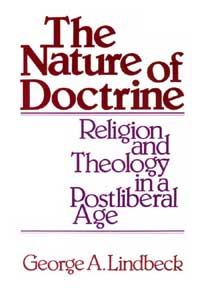I’m taking part in a week-long intensive course on ‘Doctrine and Truth After Modernity’, taught by Geoff Thompson at Trinity College, Brisbane. Today we examined the cultural-linguistic approach to doctrine developed by George Lindbeck at Yale University in the 1970s and 1980s.
 Reading up the context further I’ve come to realise that Lindbeck, a Lutheran, was heavily engaged in Lutheran-Catholic dialogue. He presents two dominant models of understanding religion and the place of doctrine in it and then presents a third option.
Reading up the context further I’ve come to realise that Lindbeck, a Lutheran, was heavily engaged in Lutheran-Catholic dialogue. He presents two dominant models of understanding religion and the place of doctrine in it and then presents a third option.
The propositionalist approach treats doctrines as informative propositions or direct truth claims about objective realities. This approach raises the stakes in such discussions by saying that a doctrine, once true, is always true, and once false, is always false.
The experiential-expressive approach regards doctrines as culturally and psychologically conditioned expressions of inner feelings and experiences of the divine. In this model, a doctrine is a completely dispensable religious artefact, and is only incidentally related to the truth which actually lies in a ‘pre-cognitive’ ‘pre-linguistic’ realm.
Lindbeck proposes the ‘cultural lingustic’ model in which doctrines are to religion what grammar is to the language of a given culture. Doctrines are the tool required to speak of God truthfully. As such they do not reflect pre-cognitive, pre-linguistic expreinces of the divine. The doctrines themselves produce, or at least structure, such experiences. In this model, doctrines to not carry the burden of being the primary focus of truth. That is borne by the community as a whole.
On reflection, I’m somewhat cautious about the polarisation Lindbeck is projecting into schools of theological thought. Most theologians would need to distort their approaches to fit into any of Lindbeck’s descriptions of theological method. I warm to Lindbeck’s use of theory from lingusitics, anthropology and sociology of religion. I find it useful to be aware of the processes being used and evoked as we attempt to engage with another doctrinally.
